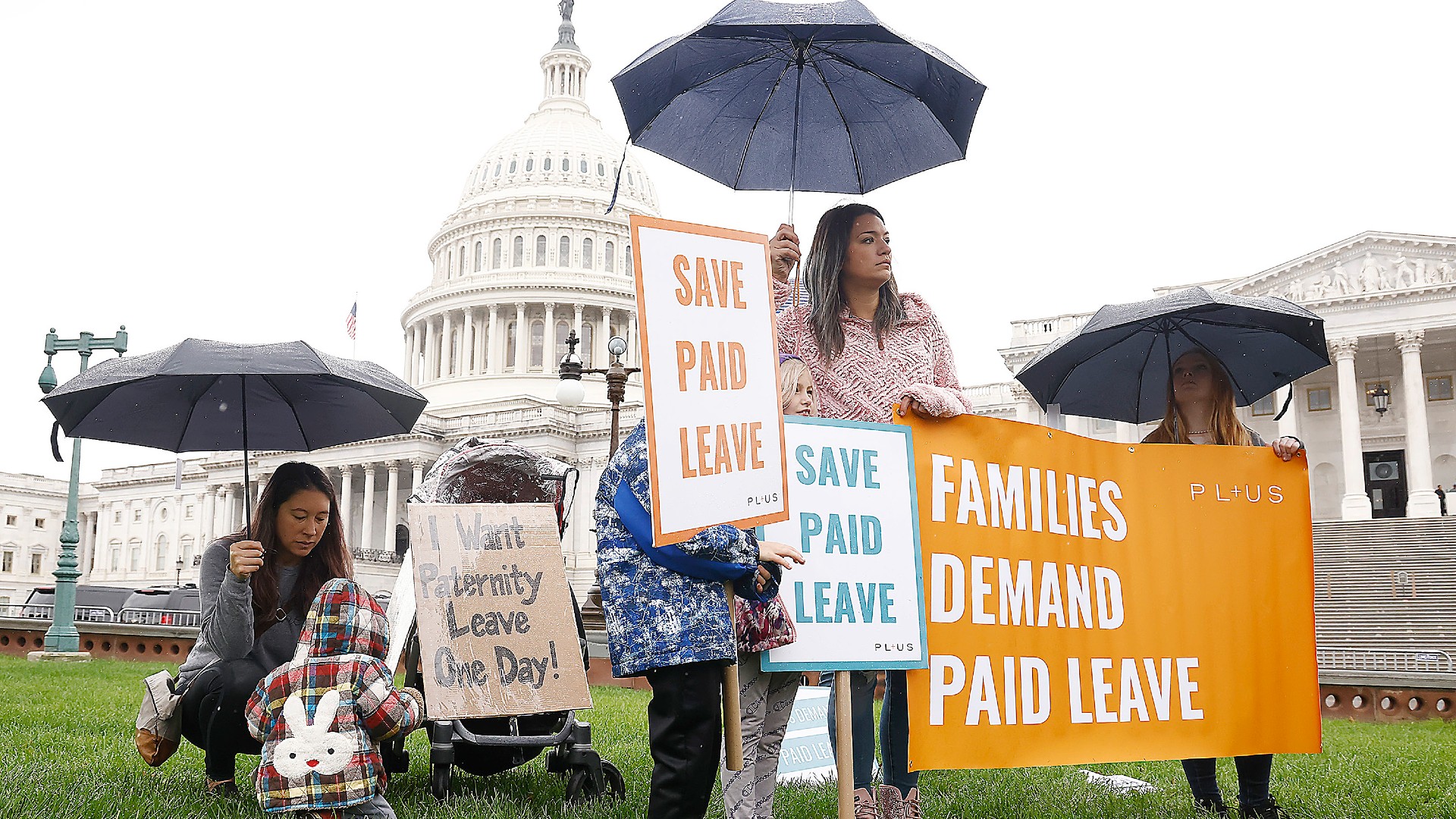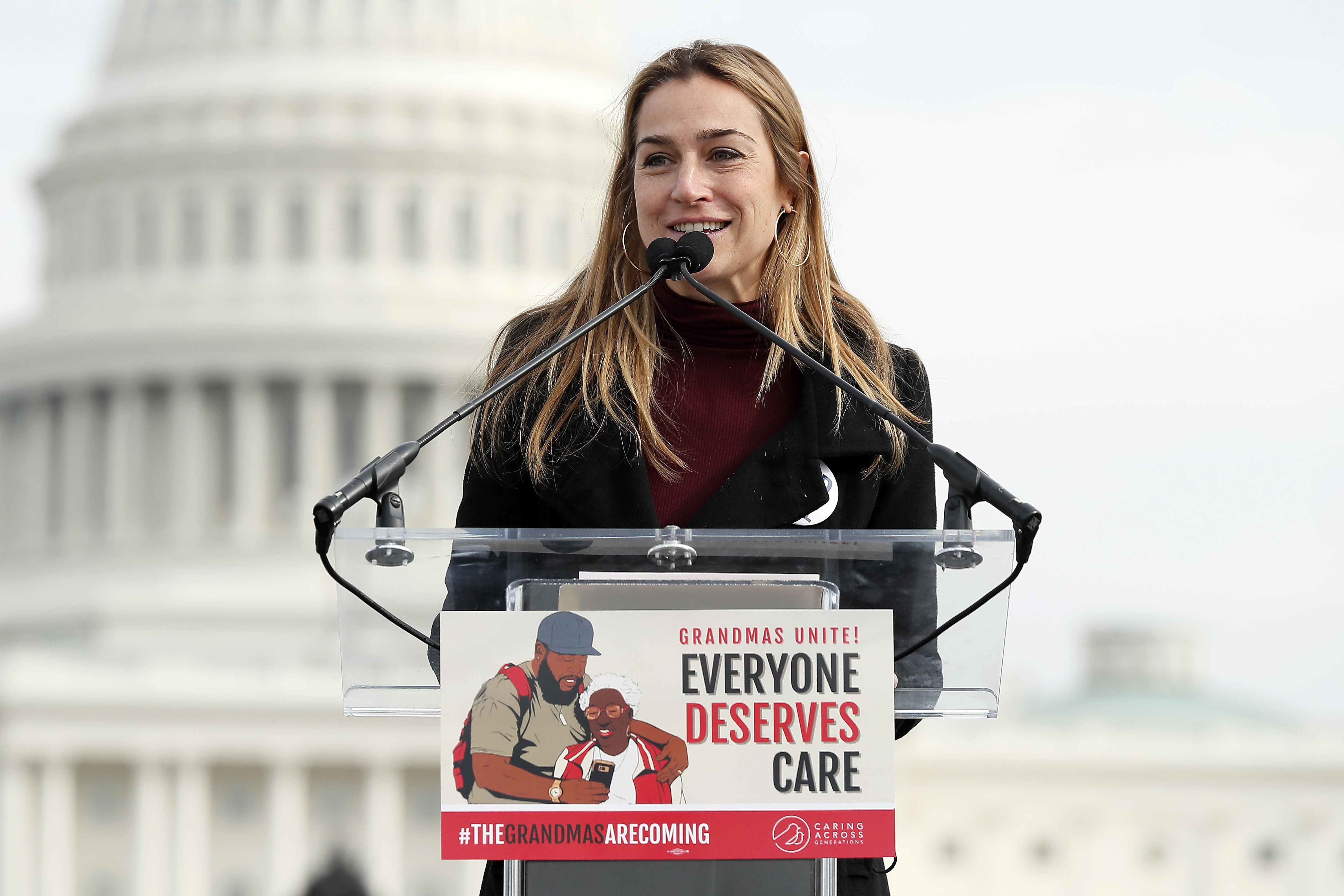What You Need to Know About Paid Leave Before the Midterms
After unprecedented progress on paid family and medical leave, policies were dropped from a bill, ending a rare opportunity to finally fill the holes in our care infrastructure. But the leader of the new Paid Leave PAC is here to tell you it’s not over.


Like many other parents, Dawn Huckelbridge has felt the rise and fall, the adrenaline rush and crash, as paid leave legislation made its way closer to passing than ever before, then shrank, died, and was resuscitated. As the director of Paid Leave for All Action, she stood in the rain with other advocates and families the day they thought it had been cut from the Build Back Better Act. She wept the next morning when she learned it hadn’t. And then it was shelved again. For now.
Here, Huckelbridge shares insights into paid leave policy and her new political action committee (PAC) focused on the subject that launched in August. She outlines everything we need to know about paid leave as we approach the highly charged midterm elections, where a number of women's issues are at stake.
Marie Claire: Why is it more important than ever for voters to pay attention to paid family and medical leave?
Dawn Huckelbridge: This year we’ve witnessed some devastating attacks on our fundamental rights. We’ve also witnessed some hard fought victories against special interests; the system working as it should. There remains a lot to be hopeful about. But on the heels of a pandemic, a caregiving crisis, and a jobs crisis specific to women, we’ve seen the policies to address these problems stalled.
After unprecedented progress on paid family and medical leave and care investments, they were dropped from [this summer's] Inflation Reduction package, which was a rare opportunity to finally fill the holes in our care infrastructure.
But I’m here to tell you, it’s not over.
MC: What is the current state of paid leave in this country?
Get exclusive access to fashion and beauty trends, hot-off-the-press celebrity news, and more.
DH: Only 23 percent of U.S. workers have access to paid family leave through an employer. Nearly one in four people who give birth return to work within two weeks and one in five retirees leave the workforce earlier than planned to care for an ill family member. Our current laws aren’t keeping up with the needs of our families or a 21st century economy.
But the paid leave movement came farther in the last two years than it has in the previous three decades, and that is because of the power of women. For the first time, a national comprehensive paid family and medical leave program was in the President’s budget and agenda. It had the support of committee chairs and congressional leadership, mirroring long-standing support from voters and advocates across the country. For the first time, a national paid leave program was passed in the U.S. House of Representatives. But then, this year, [with] a Democratic Senate vote or two in the balance—plus opposition across the aisle—the package pivoted.
I’m thrilled that President Biden and congressional Democrats have passed important investments to fight climate change, reign in the costs of prescription drugs, and reform tax rates for wealthy corporations. But systems to permanently help working people provide and receive care should not have been the first concession. They should have been a cornerstone.

Dawn Huckelbridge, Director of Paid Leave for All, speaks at a rally for the "Build Back Better" plan in December 2021.
MC: Why has paid leave been sidelined for so long?
DH: It’s not the first time issues disproportionately impacting women—and women of color, in particular—have been seen as soft or social instead of economic imperatives. It’s a thread related to political power that I’ve tried to change my entire career. It’s not the first time women and people of color have been the casualties of compromise. But it should be the last. If the issue is political power, we’re going to build more.
And so the week that the Inflation Reduction Act was announced without any care policies or paid leave [provisions] included, I launched the Paid Leave PAC. This committee, which I’ll run in my personal time, will build political power and demand accountability to finally win paid leave in the United States. Paid Leave PAC will support federal candidates who champion comprehensive paid family and medical leave policy and commit to its passage. And we are demanding they see it through. And the PAC is only the beginning.
Paid leave is one of the most widely supported policies in this country. Two-thirds of small businesses want a national program. In battleground states, supermajorities of voters want paid leave passed now, including 94 percent of Democratic women, 71 percent of Independent women, and 61 percent of Republican women. Suburban women in these states wanted paid leave more than any other policy on the table. Women's votes matter tremendously. And they determine elections.
MC: What does paid leave for all mean to you and your organization?
DH: We all should have the ability to care for ourselves and our loved ones without risking our paycheck—particularly when we know that public health is vulnerable, that overall care demands for aging parents and children will only grow. Paid leave is about our ability to be there for the people we love, our ability to sustain a family at all. It’s about our shared humanity. And, it’s about economic growth, competitiveness, and resilience. Passing paid leave with other care policies would yield millions of jobs, billions in wages, and trillions in GDP. It would reduce turnover costs, retain talented workers, and allow employers and small businesses to be more competitive.
Care and paid leave are about freedom and family in a time when many elected officials are attacking both. Paid leave is not an issue that should be cut or compromised. It’s an issue that should be run on—and won.
MC: Tell us more about your new PAC. Why did you launch it?
DH: I am launching Paid Leave PAC for the women and families who have been sidelined for too long. I'm doing this for the families I spoke to across the country: The mother who told us she kept the pajamas of the small son she cared for until he died, because they still smelled like him, but a little less every day. I'm doing this for the caregivers and essential workers, women at home and on the front lines, who risked the most during the crisis, and who continue to lose the most. I’m doing this because passing paid leave will be transformative in this country. Securing gender, racial, and economic justice requires it.
This election season I believe it’s within reach to expand the [number of] seats [in government] that will support paid leave. I believe we can demand that care and paid leave be at the top of the agenda going forward and at the heart of the next legislative package. And I believe we can secure the votes and finally pass paid family and medical leave in the United States.
We are so close. And we are building to win. We need you too—and hope you’ll join us.
Follow Dawn @dhuckelbridge as she continues to build the PAC.
This interview has been edited and condensed for clarity.

Tanya Benedicto Klich is Senior Editor at Marie Claire where she manages the Money & Career section. Over the course of her 10+ years as a journalist she has overseen the coverage of female founders, funders, executives, innovators and more. Tanya was previously a Lifestyle Reporter for Forbes, where she worked at the ForbesWomen and Forbes Lifestyle verticals. She was also a Features Editor at Entrepreneur Magazine, and a former on-air reporter for NY1 News. Tanya is also a graduate of Columbia University Graduate School of Journalism where she specialized in business & economic journalism, and is an adjunct professor at the NYU Arthur L. Carter Journalism Institute. She lives in Brooklyn with her husband and two little sons. Follow her on Twitter: @TanyaKlich